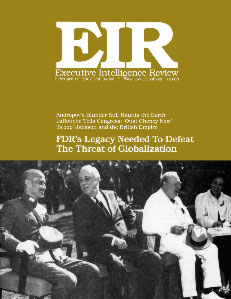Lyndon LaRouche: The Issue Is Globalization
by Lyndon H. LaRouche, Jr.
LaRouche’s opening statement at a Feb. 8 meeting of diplomats in Washington, D.C. Reviewing recent developments such as the London Economist’s touting of Britain’s imperial past; China’s demonstration of anti-satellite capabilities; and the U.S. Presidential election race, he emphasizes that “the real issue is the attempt by a group centered in the United Kingdom, and integrated with forces in the United States, typified by the circles represented by the Bush Administration—these circles are moving toward total globalization.” The only way out is to form an alliance in defense of the nation-state, with four principal countries at its core: the United States, Russia, China, and India.
The London Economist: ‘Hurrah for Imperialism!’
FDR Confronted Churchill on British Imperialism
International
Andropov’s Blunder Still Haunts the Earth
by Rachel Douglas
Communist Party General Secretary Yuri Andropov, in 1983, rejected President Ronald Reagan’s offer of Lyndon LaRouche’s policy: cooperation by the two superpowers on the development of strategic defensive weapons, anti-missile systems based on “new physical principles” such as lasers, particle-beams, and other directed-energy technologies. With that decision against the Strategic Defense Initiative (SDI), the Soviets ensured the destruction of their own regime. The consequences remain with us today.
SDI Revisited: In Defense of Strategy
by Lyndon H. LaRouche, Jr.
Excerpts from an article by Lyndon H. LaRouche, Jr., published in 21st Century Science & Technology in Summer 2000.
The Power of Ideas: SDI Changed the World
by Jeffrey Steinberg
A speech by Jeffrey Steinberg in March 1993, on the tenth anniversary of President Reagan’s announcement of the Strategic Defense Initiative,
Will Cheney Drag Israel Into War With Iran, Syria?
by Dean Andromidas
A Scientific Revolution: LYM Announces Advance in Kepler Studies
The LaRouche Youth Movement issued this press release on its breakthrough work on Johannes Kepler’s Harmony of the World.
International Intelligence
Investigation
Henry Jackson: ‘Scooping’ Up After the British Empire
by Edward Spannaus
It is indeed fitting, that the founders of the new Henry Jackson Society in Britain, proponents of Anglo-Dutch-American empire, should name themselves after the late U.S. Sen. Henry “Scoop” Jackson, who was a witting tool of those Anglo-American networks who have been out to destroy the United States for the past century, and, more broadly, since the American Revolution.
National
LaRouche to Congress and the American People: Don’t Blow It—Oust Cheney Now
by Jeffrey Steinberg and Edward Spannaus
Congress they would be making a fatal mistake, were they to sit back and count on Independent Counsel Patrick Fitzgerald to finish off the Vice President through the ongoing Scooter Libby trial. This is no time for playing opportunistic politics.
Congress Plans Escalation of Fight Against Cheney’s War Plans
by Nancy Spannaus
Economics
Hedge Funds Grab for Cash in Attempt To Stop Blowout
by Paul Gallagher and Rainer Apel
Commenting on recent upheavals in the hedge-fund markets, Lyndon LaRouche said, “What you have is madness, a madness of a bubble, like a John Law bubble, in spades. And no one really knows [what is going to happen]. If they tell you they know, they’re either stupid or lying to you.”
The Paradox of Indian Agriculture
by Ramtanu Maitra
To resolve the the desperate crisis for India’s farmers, a policy shift must be made to accord the highest priority to this sector, which has been hit hard by the scourge of globalization.
Scandinavians Reject Green Energy Trap
by Ulf Sandmark and Tom Gillesberg
Anti-Missile Shields Will Not Protect Poland From Economic Catastrophe
by Anna Kaczor
Editorial
The Economist Spills the Beans



